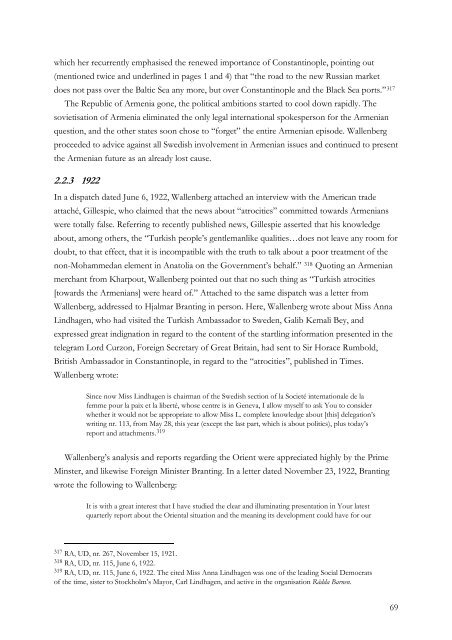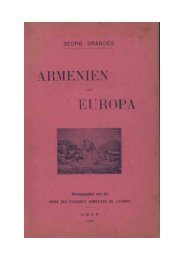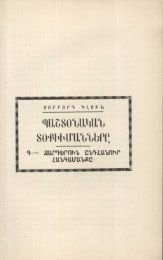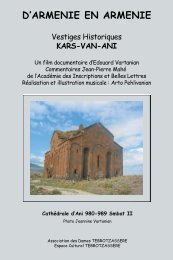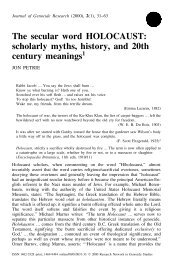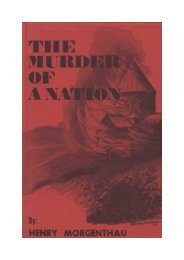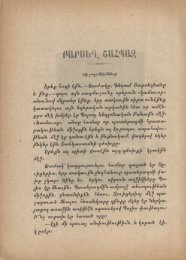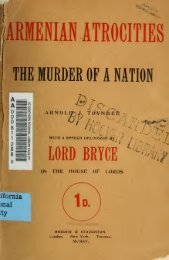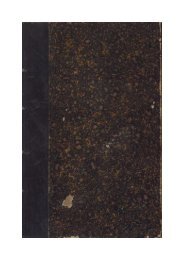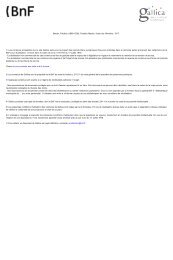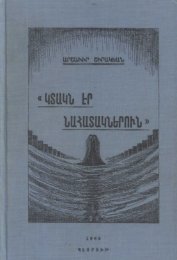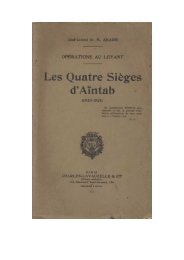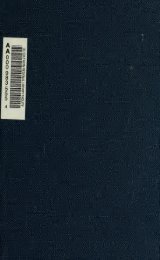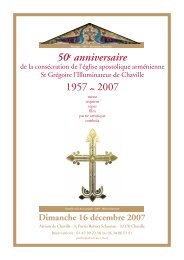Soviet Russia. Bearing in <strong>min</strong>d the political and military dialogues between the Major Powers,which did not seem to care about Armenia’s future, not least France was benevolent towardsTurkey in order to counteract the British influence in Middle East. Therefore, the mandate powerover Armenia, offered by the League of Nations to a country in Scandinavia and Sweden was of aspecial character, one which Sweden should cherish. The offered responsibility, wrote Beskow:Honoured us highly, since it was about a mandate full of difficulties and without prospects ofprofits, for which reason no one else wanted it. In that matter we could not do anything. But thatno, which was said then, shall be turned into a yes. 311The political leadership in Sweden would soon proof that they did not quite share his view.During the co<strong>min</strong>g years, Wallenberg continued his negative tone towards the Armenians andthe Armenian question. He dismissed the claims that there were any Armenians in Turkey, whatso ever. To verify that there was no Armenian c<strong>om</strong>munity in Turkey, Wallenberg cites anArmenian lawyer, who said: “We are Turks and wish to remain that way.” 312 Later Wallenbergasserts that the Armenians do not have a future anyhow. In Turkey, practically all “so-calledArmenians speak Turkish,” and “in Soviet Union they will surely be russified.” 313 Furthermore,he claimed that the strive for creating an independent Armenia was entirely a desire of DiasporaArmenians, and had no anchorage what so ever among Armenians in Armenia. In this regard hec<strong>om</strong>pared the Armenian exile organisations with the Zionist movement, of which he spokeutterly negative. 314 In a twelve pages long report, on April 19, Wallenberg reported in detail aboutthe situation in Turkey. Among other things, he made it clear that the Armenians and the Greekshave c<strong>om</strong>e to realise that simply belonging to the Christian faith of Armenian or Greek rite “doesnot justify to call oneself an Armenian or a Greek…when they have the same language andfatherland as their Muslim countrymen.” It is interesting to note that continuing his reports herefers to the “Armenians” (put in quotation marks in his text) as if the name was nothing but aninvented term. 315On October 19, Wallenberg wrote yet another letter, this time rec<strong>om</strong>mending that if Sweden,contrary to what had been expectated, would be asked to be a guarantor for a temporarygovernment in Cilicia, Sweden should, according to Wallenberg, decline for the same reasons ashe had stated in regard to the suggestion concerning the mandate power. 316 On November 15,the econ<strong>om</strong>ic values of a close relation with Constantinople were made further clear, whenWallenberg dispatched a four page report, analysing the development in the Black Sea region, in311 Beskow, 1921, p. 11.312 RA, UD, nr. 69, March 17, 1921.313 RA, UD, nr. 69, March 17, 1921.314 RA, UD, nr. 69, March 17, 1921. Richard Hovannisian’s excellent and descriptive work, Armenia on theRoad to Independence, 1918, however, gives a very different image than that depicted by Wallenberg. SeeHovannisian 1967.315 RA, UD, nr. 91, April 19, 1921.316 RA, UD, nr. 234, October 19, 1921.68
which her recurrently emphasised the renewed importance of Constantinople, pointing out(mentioned twice and underlined in pages 1 and 4) that “the road to the new Russian marketdoes not pass over the Baltic Sea any more, but over Constantinople and the Black Sea ports.” 317The Republic of Armenia gone, the political ambitions started to cool down rapidly. Thesovietisation of Armenia eli<strong>min</strong>ated the only legal international spokesperson for the Armenianquestion, and the other states soon chose to “forget” the entire Armenian episode. Wallenbergproceeded to advice against all Swedish involvement in Armenian issues and continued to presentthe Armenian future as an already lost cause.2.2.3 1922In a dispatch dated June 6, 1922, Wallenberg attached an interview with the American tradeattaché, Gillespie, who claimed that the news about “atrocities” c<strong>om</strong>mitted towards Armenianswere totally false. Referring to recently published news, Gillespie asserted that his knowledgeabout, among others, the “Turkish people’s gentlemanlike qualities…does not leave any ro<strong>om</strong> fordoubt, to that effect, that it is inc<strong>om</strong>patible with the truth to talk about a poor treatment of thenon-Mohammedan element in Anatolia on the Government’s behalf.” 318 Quoting an Armenianmerchant fr<strong>om</strong> Kharpout, Wallenberg pointed out that no such thing as “Turkish atrocities[towards the Armenians] were heard of.” Attached to the same dispatch was a letter fr<strong>om</strong>Wallenberg, addressed to Hjalmar Branting in person. Here, Wallenberg wrote about Miss AnnaLindhagen, who had visited the Turkish Ambassador to Sweden, Galib Kemali Bey, andexpressed great indignation in regard to the content of the startling information presented in thetelegram Lord Curzon, Foreign Secretary of Great Britain, had sent to Sir Horace Rumbold,British Ambassador in Constantinople, in regard to the “atrocities”, published in Times.Wallenberg wrote:Since now Miss Lindhagen is chairman of the Swedish section of la Societé internationale de lafemme pour la paix et la liberté, whose centre is in Geneva, I allow myself to ask You to considerwhether it would not be appropriate to allow Miss L. c<strong>om</strong>plete knowledge about [this] delegation’swriting nr. 113, fr<strong>om</strong> May 28, this year (except the last part, which is about politics), plus today’sreport and attachments. 319Wallenberg’s analysis and reports regarding the Orient were appreciated highly by the PrimeMinster, and likewise Foreign Minister Branting. In a letter dated November 23, 1922, Brantingwrote the following to Wallenberg:It is with a great interest that I have studied the clear and illu<strong>min</strong>ating presentation in Your latestquarterly report about the Oriental situation and the meaning its development could have for our317 RA, UD, nr. 267, November 15, 1921.318 RA, UD, nr. 115, June 6, 1922.319 RA, UD, nr. 115, June 6, 1922. The cited Miss Anna Lindhagen was one of the leading Social Democratsof the time, sister to Stockholm’s Mayor, Carl Lindhagen, and active in the organisation Rädda Barnen.69
- Page 3 and 4:
1 Introduction.....................
- Page 5 and 6:
War, rather confirm the version of
- Page 7 and 8:
1.2 Previous ResearchWhen discussin
- Page 9 and 10:
Military Attaché and the missionar
- Page 11 and 12:
situation: “It is a crime when Te
- Page 13 and 14:
in the following investigation, whi
- Page 15 and 16:
killed. The slaughterer slaughtered
- Page 17 and 18: interests. Despite his famous “14
- Page 19 and 20: morality, balance of power, or the
- Page 21 and 22: 4. International organisations (e.g
- Page 23 and 24: warring parties. 104 This observati
- Page 25 and 26: Concerning the protocols of the Swe
- Page 27 and 28: present in Turkey. These documents
- Page 29 and 30: He also mentions meeting an Armenia
- Page 31 and 32: the annihilation. General von Losso
- Page 33 and 34: 1.5 BackgroundIn order to understan
- Page 35 and 36: 1914, when two inspector-generals f
- Page 37 and 38: to Islam or were sold as slaves to
- Page 39 and 40: 2 Empirical AnalysisThe empirical r
- Page 41 and 42: It does not seem to be the Turkish
- Page 43 and 44: The Turks claim that, at the Russia
- Page 45 and 46: The Armenian population has equippe
- Page 47 and 48: 1917 was the revival year for the A
- Page 49 and 50: Even if the communication between t
- Page 51 and 52: implemented against the Armenian na
- Page 53 and 54: Anckarsvärd continued claiming tha
- Page 55 and 56: Germany is blamed for its accessory
- Page 57 and 58: Here Wirsén took the liberty to co
- Page 59 and 60: On February 19, news of new Armenia
- Page 61 and 62: estricted to the fields of intrigue
- Page 63 and 64: generous offer of President Wilson
- Page 65 and 66: Lange gave a detailed description o
- Page 67: skin was totally scorched. Another
- Page 71 and 72: The sooner calls referring to the A
- Page 73 and 74: Despite these facts, Armenia was th
- Page 75 and 76: Svenska Riksarkivet [Swedish Nation
- Page 77 and 78: Bakhtiari, Kalla det vad fan du vil
- Page 79 and 80: Chan, Steve and Drury, Cooper A., S
- Page 81 and 82: Moranian, Suzanne Elizabeth, Bearin


